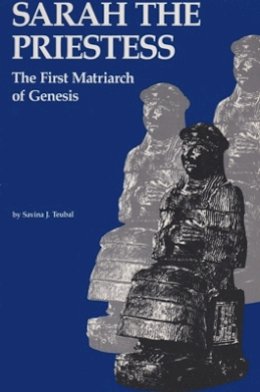
Sarah the Priestess
Savina Teubal
The only source in which Sarah is mentioned is the Book of Genesis, which contains very few highly selective and rather enigmatic stories dealing with her. On the surface, these stories tell us very little about Sarah, and what they do tell is complicated and confused by the probability that it represents residue surviving from two different written sources based on two independent oral traditions. Nevertheless, the role which Sarah plays, in the Genesis narratives, apears to be a highly energetic one, a role so active, in fact, that it repeatedly overshadows that of her husband.
In a patriarchal environment such as the Canaan of Genesis, the situation is discordant and problematic. Dr. Teubal suggests that the difficulty is eliminated, however, if we understand that Sarah and the other matriarchs mentioned in the narratives acted within the established, traditional Mesopotamian role of priestess, of a class of women who retained a highly privileged position vis-a-vis their husbands.
Dr. Teubal shows that the “Sarah tradition” represents a nonpatriarchal system struggling for survival in isolation, in the patriarchal environment of what was for Sarah a foreign society. She further indicates that the insistence of Sarah and Rebekah that their sons and heirs marry wives from the old homeland had to do not so much with preference for endogamy and cousin marriage as with their intention of ensuring the continuation of their old kahina-tradition against the overwhelming odds represented by patriarchal Canaan.
Product Details
About Savina Teubal
Reviews for Sarah the Priestess
author of The Jewish Mind and The Arab Mind
“First we had Merlin Stone’s When God Was a Woman and now we have Savina Teubal’s Sarah the Priestess. Teubal re-examines our Biblical foremothers in light of the cultural context from which they came, the ancient Mesopotamian art work, tablets, codification and legends. In her fresh, far-reaching, controversial and playful study, Teubal has altered our vision, explained mysterious references, and has produced an enormously important work.”
author of Her Mothers and A Weave of Women
“This is one of the most original and stimulating studies of patriarchal religion and traditions that has been presented to the scholarly and general public in our time. The central idea is so startling that most readers are likely to dismiss it as sheer speculation. However, the book requires the most careful and serious reading and will repay those who invest the time and effort manyfold.”
director, Studies in Religion, University of Michigan
